In every industry, the techno revolution is constantly evolving, and the world of literature is no exception. Time are gone when you need to carry around a stack of heavy books.
We are so used to our mobile phones that we check them every second, when it comes to the eBook world, millennials are reading books easily. With Ebooks, you can easily get the convenience of reading at anytime.
Today, ebooks have changed the life of bookworms, as it offers readers the convenience of reading any book with just one tap.
According to Statista, the global number of users in the eBooks segment of the digital media market was forecast to continuously increase between 2023 and 2027 by in total of 140.3 M users.
Millennials and GenZ read more than their grandparents, 80% of respondents aged around 18 to 29 year old has read a book in any format.
Whether it’s readers, small start-ups, or giant publishers, everyone is planning to go online and enhance their customer interaction. If you are one of them and are planning to build an eBook app, we got your back. In this blog, we shall be discussing topics including types of ebook apps, benefits, its key features, and the ebook app development process.
Books are a uniquely portable magic – Stephen King
Ebook App Development: Market Statistics

The ebook market has seen consistent growth over the years, driven by factors like the convenience of digital reading, the proliferation of smartphones and tablets, and the availability of diverse ebook content.
- According to a report, 72% e-reader market belongs to Kindle.
- Kindle’s biggest competitors are Apple, Google’s ebook reading apps, Barnes & Noble’s Nook, Kobo Books, PocketBook, etc.
- The eBook market segment will reach around $15.3 Bn by 2027 at a CAGR of 8.26% according to Statista.
Understanding Ebook App Development

Before we dive into e-book app development, let’s talk about what is an eBook app.
Simply, eBook app is a software application that is used to read books. And they are designed for mobile devices (smartphones and tablets) or desktop computers. E-Book allows users to read electronic books also known as eBooks.
Moreover, the best ebook apps serve as digital platforms for storing, managing, and reading a wide range of digital books. It comes in various formats, such as EPUB, PDF, MOBI, and more.
The main reason behind the popularity of eBook apps is the convenience they offer readers to read book online.
Types of Ebook Reader Apps
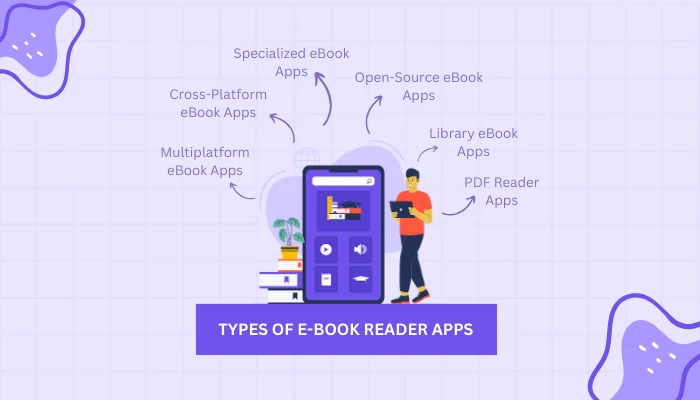
Ebook readers come in various types, each catering to different user preferences and needs. Here are some popular best Ebook reader apps:
Multiplatform EBook Apps
1. Amazon Kindle
Available on iOS, Android, and desktop platforms, it’s one of the ebook apps with access to the vast Amazon ebook app Kindle Store.
2. Apple Books
Exclusive to iOS and macOS devices, it integrates with the Apple ecosystem.
3. Google Play Books
Available on both Android and iOS platforms, it offers a wide selection of ebooks.
Cross-Platform Ebook apps
4. Adobe digital editions
A desktop app for managing and reading DRM-protected ePub and PDF ebooks, often used for library ebooks.
5. Calibre
Primarily an ebook library management tool for desktops, it also has a built-in ebook reader.
Specialized Ebook Apps
6. Comics and graphic novel apps
Apps like ComiXology or Marvel Unlimited cater specifically to comic book readers.
7. Children’s Ebook apps
Apps like Epic of FarFaria offer a wide range of children’s ebooks with interactive features.
8. Audiobook apps
While not traditional ebooks, apps like Audible and audiobooks.com allow users to listen to audiobooks.
Open-Source Ebook apps
9. FBReader
Available on various platforms, it’s an open-source ebook reader supporting multiple formats.
10. Cool Reader
An open-source eBook app for Android devices, offering customization options.
Library Ebook apps
Many libraries offer their own ebook apps, such as OverDrive, Libby (by OverDrive), and Hoopla allowing patrons to borrow digital books.
PDF Reader Apps
While not strictly ebook apps, PDF readers like Adobe Acrobat Reader, PDF Expert, and Microsoft Edge can be used for reading ebooks in PDF format.
Benefits of Ebook App Development
| Convenience | Users can carry a vast library of books in their pocket, eliminating the need for physical books & providing portability. |
| Accessibility | Some of the best ebook app make reading materials accessible to a wide audience, including those with disabilities. |
| Cost-effective | Ebook apps reduce production and distribution costs for publishers and authors. |
| Environmental impact | The best thing about these apps is they contribute to a greener environment by reducing the need for paper & physical book production. |
| Global reach | Publishers can reach a global audience without the limitations of physical distribution. |
| Monetization | Various revenue streams, including book sales and subscriptions, are available to publishers. |
| Offline reading | Ebook apps support offline reading, ensuring access without an internet connection. |
| Security | Digital rights management DRM options protect copyrighted content from piracy. |
Custom Ebook App Development Key Features
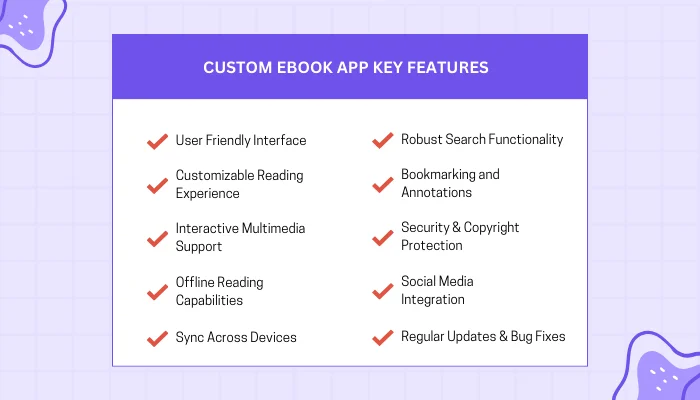
Before you dive into ‘how to create ebook app’ let’s discuss the key features of a custom eBook app.
1. User-Friendly Interface
One of the fundamental aspects of any successful eBook app is its user interface. It should be intuitive, easy to navigate, and visually appealing.
Moreover, users should be able to access their books, bookmarks, and settings effortlessly.
2. Customizable Reading Experience
Allow readers to personalize their reading experience.
By including features like adjustable font size, background color, and font style enhance readability. Plus, providing day and night mode options reduces strain on the eyes during extended reading sessions.
3. Interactive Multimedia Support
Enhance engagement by integrating multimedia elements such as audio, video, and interactive images.
With this feature, it enriches the content and provides a dynamic reading experience.
4. Offline Reading Capabilities
When you make your own ebook app you should enable users to download books for offline reading.
Additionally, this feature ensures uninterrupted access to content, even without an internet connection.
5. Sync Across Devices
Implement cloud synchronization to enable users to switch between devices seamlessly.
Moreover, readers can start a book on their tablet and continue from the same page on their smartphone.
6. Robust Search Functionality
Include a powerful search feature that allows users to find specific words, phrases, or topics within the eBook.
Plus, a well-organized search function enhances the overall user experience.
7. Bookmarking and Annotations
Enable users to create bookmarks and annotations within the reading apps like Kindle eBook.
However, this feature enhances interactivity, allowing readers to highlight important passages and take notes.
8. Security and Copyright Protection
It’s important if you develop apps like Kindle you have to implement security measures to protect intellectual property rights.
Moreover, digital rights management (DRM) ensures that copyrighted content is secure and accessible only to authorized users.
9. Social Media Integration
Integrate social media sharing options, it enable readers to share their favorite book or passage with social networks. This is also beneficial for creating a sense of community among the readers.
10. Regular Updates & Bug Fixes
To maintain user satisfaction, it is essential to provide ebook app features with regular updates. Also, regular update is helpful in addressing bugs and elemenating errors.
Ebook app development: Step-by-step guide
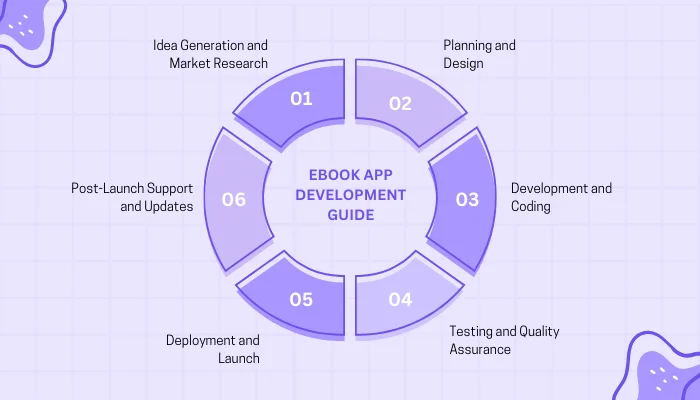
We have already discussed eBook benefits and types. It’s time for you to develop an eBook app that involves several steps, from concept to deployment.
By following step-by-step guide you can start Reading app development process.
Step 1. Idea Creation & Market Research
Starting with Idea generation
Starting with brainstorming the ideas and unique features that you want to include in your ebook app. You can do this by considering what your user needs.
Now where did you find what your user needs is you have to do extensive market research.
Market Research
Now, by conducting thoroughly market research or going through the competitors app you find loop holes in the market.
By analyzing existing apps, helps you to identify weak spot and strengths of your competitors. This would be helpful for you to fulfil the market gaps..
Step 2. Planning and Design
Project Planning
In this process, create proto of online ebook app project plan. By outlining the app’s features, functionalities, and development timeline.
Plus, you can define the target audience, platforms (iOS, Android, or both), and technical requirements.
User Interface (UI) and User Experience (UX) Design
Now design an intuitive & visually appealing UI/UX of ebook app design.
The team of UI/UX designers create wireframes and prototypes for the frontend of the app.
Step 3. Development
Choosing the Right Technology Stack
Select appropriate programming languages (such as Java, Swift, or Kotlin) and frameworks for your app.
Moreover, consider using cross-platform development tools like React Native or Flutter to develop for multiple platforms simultaneously.
Frontend and Backend Development
Now, frontend and backend work hand in hand. The process into frontend (user-facing components) and backend (server-side logic and databases).
Ask you team of designers and developers to create responsive frontend elements and robust backend functionalities.
Step 4. Testing & Quality Assurance
Unit Testing
Don’t forget to conduct mobile app testing. It will help you to identify bugs and errors. This will help you to fix bugs or errors in the code to ensure each part functions as intended.
Integration Testing
Now test the interaction between different components, this will help you to ensure that they are working in harmonious way. This testing is crucial for app as it helps to identify the issues that arises with different modules.
User Acceptance Testing (UAT)
It’s time to engage beta testers to evaluate the app. Now gather the feedback on usability, performance, and use this feedback to make necessary improvements before launching it in the market.
Step 5. Deployment and Launch
App Store Submission
Now, prepare the app for submission to app stores (such as Apple App Store and Google Play Store). By creating engaging app descriptions, captivating visuals, and compelling promotional materials it will help you to attract potential users.
Marketing and Promotion
Mobile app marketing strategies are crucial for app success. So implement a marketing strategy to generate buzz around the app’s launch.
Marketing & promotion is just a waste until you utilize social media, blogs, and other platforms to create awareness.
Step 6. Post-Launch Support and Updates
User Support
This is also a crucial aspect of the app. It is essential to provide efficient customer support to address user queries, concerns, or issues promptly.
However, a responsive support system enhances user satisfaction & encourages positive reviews.
Regular Updates
Lastly, continuously monitor user feedback and release regular updates with new features, bug fixes, and performance enhancements. This will help you to optimize your app time to time.
How much does it cost to develop an eBook app?
The cost determination is always complex as nobody could provide you with the precise cost of developing an eBook app. It can be challenging as it depends on various factors, including
- Complexity of the app
- Desired features
- Platform (iOS, Android, or both)
- Design elements
- Security measures
- Third-party integrations
- Testing requirements
- Ongoing support.
Typically, basic ebook app development cost with standard features can build from $10,000 to $50,000.
When it comes to complex app the cost could be from $50,000 to $150,000 or more.
Cross-platform apps might have slightly higher costs due to the additional effort required for compatibility across multiple platforms.
It is recommended to consult the cost with an expert mobile app development company to get detailed quote on your app specific requirement. They can give you access to the projects and provide you with more accurate cost for your eBook app.
Conclusion
eBook app development is creating buzz in the eLearning market. Whether its augmented reality to personalized reading. User are driven by the fascinating features these apps are offering.
If you are planning to develop ebook app for your reader its time for you to invest in the ebook app development company. But it is recommended to consult with the mobile app development company before you invest in this profitable venture. To know more feel free to connect with us.
FAQs
Soon, technologies like augmented reality (AR), artificial intelligence (AI), and blockchain are expected to revolutionize eBook apps. AR will offer immersive reading experiences, AI will enable personalized content recommendations, and blockchain will enhance content security and copyright protection.
eBook apps can adapt by incorporating features such as interactive storytelling, audio-visual enhancements, and social reading communities.
Additionally, offering personalized content suggestions based on users’ reading habits and preferences ensures a tailored reading experience.
AI will play a pivotal role in eBook apps by analyzing user behavior, preferences, and reading patterns. This data will be utilized to offer personalized recommendations, enhance user engagement, and create adaptive content that resonates with individual readers.
eBook apps can revolutionize education by providing interactive textbooks, multimedia-rich learning materials, and collaborative platforms for students and educators. These apps promote interactive learning, making education more engaging, accessible, and effective.
Aspiring developers should actively participate in industry forums, attend tech conferences, and engage with online communities focused on app development. Additionally, following renowned tech blogs and exploring open-source projects can provide valuable insights into the latest trends and innovations in eBook app development.

Udai Singh is a senior content writer with over 6 years of experience in creating content for FinTech, eWallet, EdTech, and App Development. He is an expert in simplifying complex concepts and creating engaging content that resonates with the audience.
Table of Contents









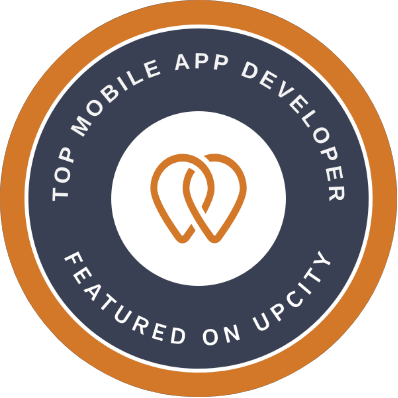
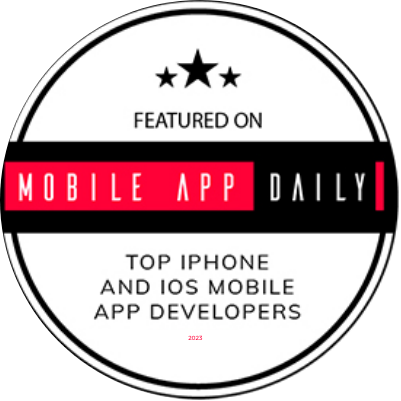
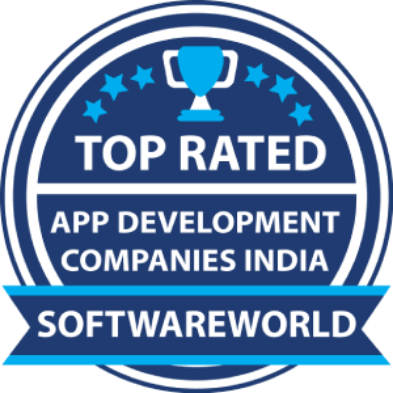
No Comments
Comments are closed.